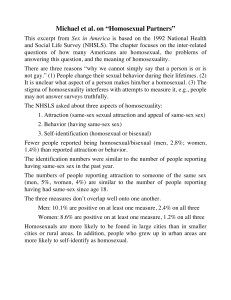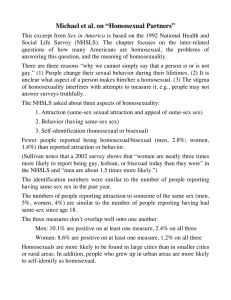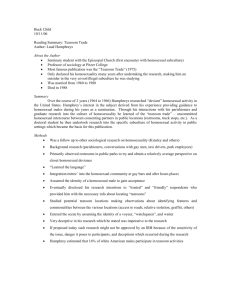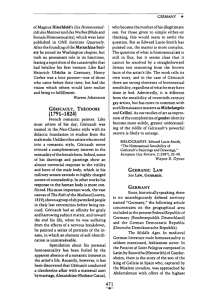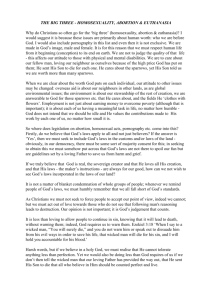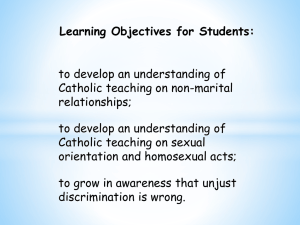Department of Defense INSTRUCTION NUMBER 1332.14 SUBJECT: Enlisted Administrative Separations
advertisement
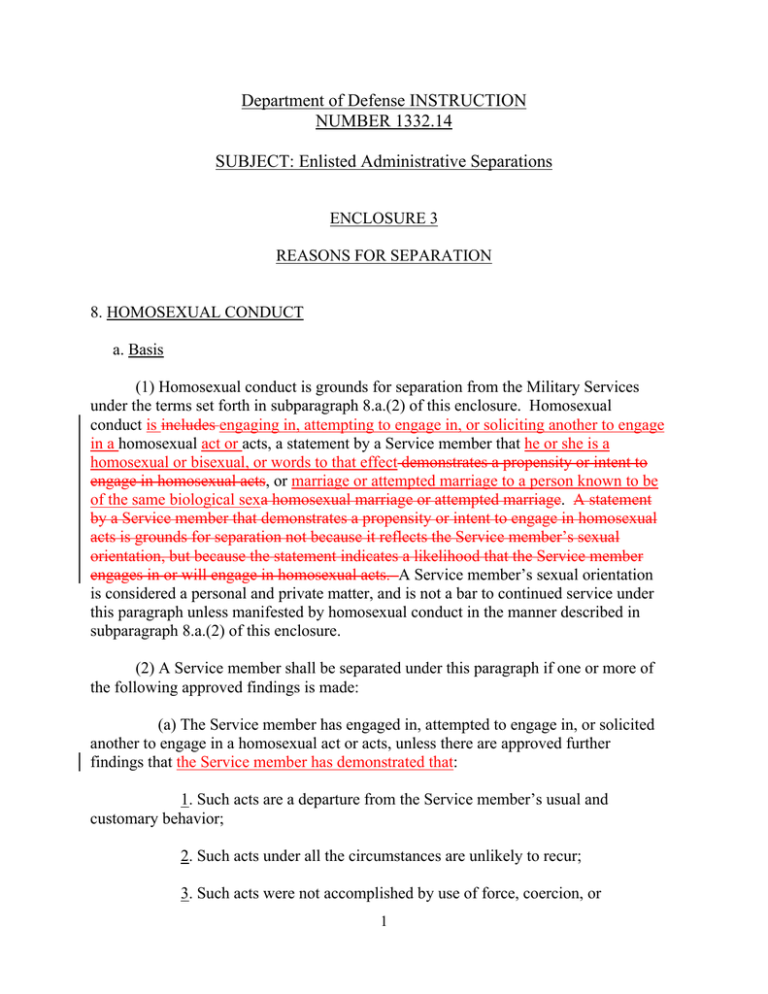
Department of Defense INSTRUCTION NUMBER 1332.14 SUBJECT: Enlisted Administrative Separations ENCLOSURE 3 REASONS FOR SEPARATION 8. HOMOSEXUAL CONDUCT a. Basis (1) Homosexual conduct is grounds for separation from the Military Services under the terms set forth in subparagraph 8.a.(2) of this enclosure. Homosexual conduct is includes engaging in, attempting to engage in, or soliciting another to engage in a homosexual act or acts, a statement by a Service member that he or she is a homosexual or bisexual, or words to that effect demonstrates a propensity or intent to engage in homosexual acts, or marriage or attempted marriage to a person known to be of the same biological sexa homosexual marriage or attempted marriage. A statement by a Service member that demonstrates a propensity or intent to engage in homosexual acts is grounds for separation not because it reflects the Service member’s sexual orientation, but because the statement indicates a likelihood that the Service member engages in or will engage in homosexual acts. A Service member’s sexual orientation is considered a personal and private matter, and is not a bar to continued service under this paragraph unless manifested by homosexual conduct in the manner described in subparagraph 8.a.(2) of this enclosure. (2) A Service member shall be separated under this paragraph if one or more of the following approved findings is made: (a) The Service member has engaged in, attempted to engage in, or solicited another to engage in a homosexual act or acts, unless there are approved further findings that the Service member has demonstrated that: 1. Such acts are a departure from the Service member’s usual and customary behavior; 2. Such acts under all the circumstances are unlikely to recur; 3. Such acts were not accomplished by use of force, coercion, or 1 intimidation; 4. Under the particular circumstances of the case, the Service member’s continued presence in the Armed Forces is consistent with the interest of the Armed Forces in proper discipline, good order, and morale; and 5. The Service member does not have a propensity or intent to engage in homosexual acts. (b) The Service member has made a statement that he or she is a homosexual or bisexual, or words to that effect, unless there is a further approved finding that the Service member has demonstrated that he or she is not a person who engages in, attempts to engage in, has a propensity to engage in, or intends to engage in homosexual acts. A statement by a Service member that he or she is a homosexual or bisexual, or words to that effect, creates a rebuttable presumption that the Service member is a person who engages in, attempts to engage in, has a propensity to engage in, or intends to engage in homosexual acts. The Service member shall be advised of this presumption and given the opportunity to rebut the presumption by presenting evidence demonstrating that he or she does not is not a person who engages in, attempts to engage in, hasve a propensity to engage in, or intends to engage in homosexual acts. Propensity to engage in homosexual acts means more than an abstract preference or desire to engage in homosexual acts; it indicates a likelihood that a person engages in or will engage in homosexual acts. In determining whether a Service member has successfully rebutted the presumption that he or she is a person who engages in, attempts to engage in, or has a propensity or intent to engage in homosexual acts, some or all of the following may be considered: 1. A statement under oath by the Service member that he or she is not a person who engages in, attempts to engage in, has a propensity to engage in, or intends to engage in homosexual acts; 21. Whether the Service member has engaged in homosexual acts; 2. The Service member’s credibility; 3. Testimony from others about the Service member’s past conduct, character, and credibility; 4. The nature and circumstances of the Service member’s statement; 5. Any other evidence relevant to whether the Service member is likely to engage in homosexual acts. (This list is not exhaustive; any other relevant evidence may also be considered.) 2 (c) The Service member has married or attempted to marry a person known to be of the same biological sex (as evidenced by the external anatomy of the persons involved). b. Burden of Proof. See subparagraphs 8.d.(5) and 8.d.(6) of this enclosure for guidance as to the burden of proof and when a finding regarding retention is required. c. Characterization or Description. Characterization of service or description of separation shall be in accordance with the guidance in paragraph 3 of Enclosure 4. When the sole basis for separation is homosexual conduct, a characterization under other than honorable (OTH) conditions may be issued only if such a characterization is warranted under paragraph 3 of Enclosure 4, and if there is a finding that during the current term of service the Service member attempted, solicited, or committed a homosexual act. Circumstances that warrant consideration of an OTH include a finding that the Service member attempted, solicited, or committed a homosexual act as follows: (1) By using force, coercion, or intimidation. (2) With a person under 16 years of age. (3) With a subordinate in circumstances that violate customary military superiorsubordinate relationships; (4) Openly in public view. (5) For compensation. (6) Aboard a military vessel or aircraft. (7) In another location subject to military control under aggravating circumstances noted in the finding that have an adverse impact on discipline, good order, or morale comparable to the impact of such activity aboard a vessel or aircraft. d. Procedures. The Administrative Board procedure under paragraph 3 of Enclosure 6 shall be used, subject to the following guidance: (1) Separation processing shall be initiated if there is probable cause to believe separation is warranted under subparagraph 8.a.(2) of this enclosure. For purposes of making this probable cause determination, the standards set forth in subparagraphs 2.c-f of Enclosure 5 are applicable. (a) Only a commander in the Service member’s chain of command, in the grade of O-7 or higher, is authorized to initiate separation proceedings on the basis of 3 alleged homosexual conduct. (b) Procedures for inquiries into homosexual conduct are outlined in Enclosure 5. (2) The Administrative Board shall follow the procedures set forth in subparagraph 3.e. of Enclosure 6, except with respect to the following matters: (a) If the Board finds that one or more of the circumstances authorizing separation under subparagraph 8.a.(2) of this enclosure is supported by a preponderance of the evidence, the Board shall recommend separation unless the Board finds that retention is warranted under the limited circumstances described in that paragraph. (b) If the Board does not find that there is sufficient evidence that one or more of the circumstances authorizing separation under subparagraph 8.a.(2) of this enclosure has occurredis supported by a preponderance of the evidence, the Board shall recommend retention unless the case involves another basis for separation of which the Service member has been duly notified. (3) In any case in which characterization of service under other than honorable conditions is not authorized, the separation authority may be exercised by an officer designated under subparagraph 2.d.(1) of Enclosure 6.The separation authority disposing of the case shall be a general or flag officer, of equal grade or senior to the commander initiating a fact-finding inquiry or separation proceeding, in the Service member’s chain of command or serving as a Service-designated centralized separation authority. (4) The separation authority shall dispose of the case according to the following provisions: (a) If the board recommends retention, the separation authority shall take one of the following actions: 1. Approve the finding and direct retention; or 2. Forward the case to the Secretary concerned with a recommendation that the Secretary separate the Service member under the Secretary’s plenary authority in paragraph 15 of this enclosure. (b) If the board recommends separation, the separation authority shall take one of the following actions: 1. Approve the finding and direct separation; or 4 2. Disapprove the finding on the basis of the following considerations: a. There is insufficient evidence to support the finding; or b. Retention is warranted under the limited circumstances described in subparagraph 8.a.(2) of this enclosure. (c) If there has been a waiver of Board proceedings, the separation authority shall dispose of the case in accordance with the following provisions: 1. If the separation authority determines there is not sufficient evidence to support separation under subparagraph 8.a.(2) of this enclosure, the separation authority shall direct retention unless there is another basis for separation of which the Service member has been duly notified. 2. If the separation authority determines that one or more of the circumstances authorizing separation under subparagraph 8.a.(2) of this enclosure is supported by a preponderance of the evidencehas occurred, the Service member shall be separated unless retention is warranted under the limited circumstances described in that subparagraph. (5) The Service member shall bear the burden of proving throughout the proceeding, by a preponderance of the evidence, that retention is warranted under the limited circumstances described in subparagraphs 8.a.(2)(a) and 8.a.(2)(b) of this enclosure. (6) Findings regarding whether or not retention is warranted are required if the Service member clearly and specifically raises such limited circumstances as described in subparagraph 8.a.(2) of this enclosure. (7) Nothing in these procedures: (a) Limits the authority of the Secretary concerned to take appropriate action in a case to ensure compliance with this issuance; (b) Requires that a Service member be processed for separation when a determination is made in accordance with regulations prescribed by the Secretary concerned that: 1. The Service member engaged in acts, made statements, or married or attempted to marry a person known to be of the same biological sex for the purpose of avoiding or terminating military service; and 5 2. Separation of the Service member would not be in the best interest of the Armed Forces. (c) Precludes retention of a Service member for a limited period of time in the interests of national security as authorized by the Secretary concerned; (d) Authorizes a Service member to seek Secretarial review unless authorized in procedures promulgated by the Secretary concerned; (e) Precludes separation in appropriate circumstances for another reason in this Instruction; or (f) Precludes trial by courts-martial in appropriate cases. 6 ENCLOSURE 5 GUIDELINES FOR FACT-FINDING INQUIRIES INTO HOMOSEXUAL CONDUCT 1. RESPONSIBILITY a. Only a Service member’s commander in the Service member’s chain of command, in the grade of O-7 or higher, is authorized to initiate fact-finding inquiries involving homosexual conduct. A commander may initiate a fact-finding inquiry only when he or she has received credible information that there is basis for discharge. Commanders are responsible for ensuring that inquiries are conducted properly and that no abuse of authority occurs. b. A fact-finding inquiry may be conducted by the commander personally or by a person he or she appoints, but the appointee must be in the grade of O-5 or higher, or civilian equivalent. It The inquiry may consist of an examination of the information reported or a more extensive investigation, as necessary. c. The inquiry should gather all credible information that directly relates to the grounds for possible separation. Inquiries shall be limited to the factual circumstances directly relevant to the specific allegations. d. If a commander has credible evidence of possible criminal conduct, he or she shall follow the procedures outlined in Reference (o) and implementing regulations issued by the Secretaries of the Military Departments concerned. e. The guidelines in this enclosure do not apply to activities referenced in DoDI 5505.8 (Reference (t)). 2. BASIS FOR CONDUCTING INQUIRIES a. A commander will initiate an inquiry only if he or she has credible information that there is a basis for discharge. Credible information exists when the information, considering its source and the surrounding circumstances, supports a reasonable belief that there is a basis for discharge. A determination is made based on articulable facts, not just a belief or suspicion. b. A basis for discharge exists if: (1) The Service member has engaged in, attempted to engage in, or solicited 7 another to engage in a homosexual act or acts. (2) The Service member has said made a statement that he or she is a homosexual or bisexual, or made some other statement that indicates a propensity or intent to engage in homosexual acts words to that effect; or (3) The Service member has married or attempted to marry a person known to be of the same biological sex. c. Credible information does not exist, for example, when: (1) The individual is suspected of engaging in homosexual conduct, but there is no credible information, as described, to support that suspicion; or (2) The only information is the opinions of others that a Service member is homosexual; or (3) The inquiry would be based on rumor, suspicion, or capricious claims concerning a Service member’s sexual orientation; or (4) The only information known is an associational activity such as going to a gay bar, possessing or reading homosexual publications, associating with known homosexuals, or marching in a gay rights rally in civilian clothes. Such activity, in and of itself, does not provide evidence of homosexual conduct.; or (5) The information does not come from a reliable person. d. Credible information exists, for example, when: (1) A Service member states to a person of senior grade and authority within his or her chain of command that he or she is a homosexual or bisexual, or words to that effect; or (21) A reliable person states, under oath, that he or she observed or heard a Service member engageing in, attempt to engage in, or solicit another to engage in a homosexual act or acts, or saying that he or she is a homosexual or bisexual or is married to a person of the same sex; or (32) A reliable person states, under oath, that he or she was told by heard, observed, or discovered a Service member that he or she is a homosexual or bisexual, or words to that effectmake a spoken or written statement that a reasonable person would believe was intended to convey the fact that he or she engages in, attempts to engage in, or has a propensity or intent to engage in homosexual acts; or 8 (4) A reliable person states, under oath, that a Service member has married or attempted to marry a person known to be of the same biological sex. (3) A reliable person states that he or she observed behavior that amounts to a nonverbal statement by a Service member that he or she is a homosexual or bisexual; i.e., behavior that a reasonable person would believe was intended to convey the statement that the Service member engages in, attempts to engage in, or has a propensity or intent to engage in homosexual acts. e. A “reliable person” is someone who would be expected, under the circumstances, to provide accurate information. Examples of a person who may not be a “reliable person” are: (1) A person with a prior history of untruthfulness or unreliability; or (2) A person with a motive to seek revenge against or to cause personal or professional harm to the Service member specifically, or to cause personal or professional harm to persons suspected of being homosexual generally; or (3) A person with a prior history of conflict with the Service member. f. The following information shall not be considered evidence of or be used for purposes of fact-finding inquiries or separation proceedings regarding homosexual conduct, unless the Service member consents in writing that the information may be used: (1) Information considered privileged pursuant to Rule 502 (“Lawyer-client privilege”), Rule 503 (“Communications to Clergy”), or Rule 513 (“Psychotherapistpatient privilege”) of the Military Rules of Evidence; (2) Information provided by a Service member to a medical professional in furtherance of medical treatment, or to a public health official in the course of a public health inquiry; (3) Information provided by a Service member in the course of seeking professional assistance for domestic or physical abuse sustained by the Service member or by a member of his or her household; (4) Information about a Service member’s sexual orientation or conduct obtained in the course of a personnel security investigation, in accordance with and to the extent protected by DoD 5200.2-R (“Department of Defense Personnel Security Program”). 9 3. PROCEDURES a. Informal fact-finding inquiries and administrative separation procedures are the preferred method of addressing homosexual conduct. This procedure does not prevent disciplinary action or trial by courts-martial when appropriate. b. Commanders shall exercise sound discretion regarding when credible information exists. They shall examine the information, the source of the information, and the circumstances under which the information was obtained and decide whether an inquiry is warranted or whether no action should be taken. c. Commanders or appointed inquiry officials shall not ask, and Service members shall not be required to reveal, whether a Service member is a heterosexual, a homosexual, or a bisexual. However, upon receipt of credible information of homosexual conduct (as described in paragraph 2 of this enclosure) commanders or appointed inquiry officials may ask Service members if they engaged in such conduct after advising Service member of the DoD policy on homosexual conduct and their rights under Article 31 of the UCMJ, Appendix 2 of Reference (o), if applicable. Should the Service member choose not to discuss the matter further, the commander should consider other available information. No negative inference may be drawn from a Service member’s decision not to discuss the matter. Nothing in this provision precludes questioning a Service member about any information provided by the Service member in the course of the fact-finding inquiry or any related proceeding, nor does it provide the Service member with any basis for challenging the validity of any proceeding or the use of any evidence, including a statement by the Service member, in any proceeding. d. At any given point of the inquiry, the commander or appointed inquiry official must be able to clearly and specifically explain which grounds for separation he or she is attempting to verify and how the information being collected relates to those specific separation criteria. e. A statement by a Service member that he or she is a homosexual or bisexual creates a rebuttable presumption that the Service member engages in, attempts to engage in, has a propensity to engage in, or intends to engage in homosexual acts. The Service member shall be given the opportunity to present evidence demonstrating that he or she does not engage in, attempt to engage in, or have a propensity or intent to engage in homosexual acts. f. The Service member bears the burden of proving, by a preponderance of the evidence, that he or she is not a person who engages in, attempts to engage in, has a propensity to engage in, or intends to engage in homosexual acts. 10 4. LEGAL EFFECT. The procedures in this enclosure create no substantive or procedural rights. 11 GLOSSARY bisexual. A person who engages in, attempts to engage in, has a propensity to engage in, or intends to engage in homosexual and heterosexual acts. commander. A commissioned or warrant officer who, by virtue of rank and assignment, exercises primary command authority over a military organization or prescribed territorial area that, under pertinent official directives, is recognized as a “command.” convening authority The separation authority; or A commanding officer who has been authorized by the Secretary concerned to process a case except for final action and who otherwise has the qualifications to act as a separation authority. discharge. Complete severance from all military status gained through enlistment or induction. entry-level status. Upon enlistment, a Service member qualifies for entry-level status during: The first 180 days of continuous active military service; or The first 180 days of continuous active service after a service break of more than 92 days of active service. A Service member of a Reserve Component who is not on active duty or who is serving under a call or order to active duty for 180 days or less begins entry-level status upon enlistment in a Reserve Component. Entry-level status for such a Service member of a Reserve Component terminates as follows: One hundred eighty days after beginning training if the Service member is ordered to active duty for training for one continuous period of 180 days or more; or Ninety days after the beginning of the second period of active duty training if the Service member is ordered to active duty for training under a program that splits the training into two or more separate periods of active duty. For the purposes of characterization of service or description of separation, the Service member’s status is determined by the date of notification as to the initiation of separation proceedings. homosexual. A person, regardless of sex, who engages in, attempts to engage in, has a propensity to engage in, or intends to engage in homosexual acts. 12 A “homosexual act” means any bodily contact, actively undertaken or passively permitted, between a Service member and another person of the same sex for the purpose of satisfying sexual desires and any bodily contact (for example, hand-holding or kissing, in most circumstances) that a reasonable person would understand to demonstrate a propensity or intent to engage in such an act. A “statement that a Service member is a homosexual or bisexual, or words to that effect,” means language or behavior that a reasonable person would believe was intended to convey the statement that the Service member is a person who engages in, attempts to engage in, or has a propensity to engage in, or intent intends to engage in homosexual acts. This may include statements such as “I am a homosexual,” “I am gay,” “I am a lesbian,” “I have a homosexual orientation,” and the like. A “homosexual marriage or attempted marriage” is when a Service member has married or attempted to marry a person known to be of the same biological sex. “Propensity to engage in homosexual acts” means more than an abstract preference or desire to engage in homosexual acts; it indicates a likelihood that a person engages in or will engage in homosexual acts. homosexual conduct. Engaging in, attempting to engage in, or soliciting another to engage in a homosexual act or acts; a statement by the Service member that he or she is a homosexual or bisexual, or words to that effect; or marriage or attempted marriage to a person known to be of the same biological sex.A homosexual act, a statement by the Service member that demonstrates a propensity or intent to engage in homosexual acts, or a homosexual marriage or attempted marriage. Service member. An enlisted or officer Service member of a Military Service. military record. An individual’s overall performance while a Service member of a Military Service, including personal conduct and performance of duty. release from active duty. Termination of active duty status and transfer or reversion to a Reserve Component not on active duty, including transfer to the IRR. respondent. A Service member who has been notified that action has been initiated to separate the Service member. separation. A general term that includes discharge, release from active duty, release from custody and control of the Armed Forces, transfer to the IRR, and similar changes in Active or Reserve status. separation authority. An official authorized by the Secretary concerned to take final 13 action with respect to a specified type of separation. sexual orientation. An abstract sexual preference for persons of a particular sex, as distinct from a propensity or intent to engage in sexual acts. 14
